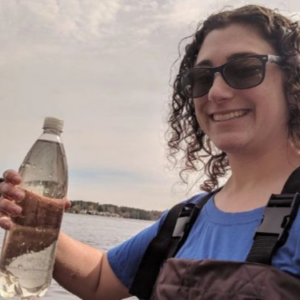“Inside the Classroom” with Rachel Buckley
April 22, 2020

Meet Rachel Buckley, a 7th grade science teacher at Knox Trail Middle School in Spencer, Massachusetts. As a field test participant, she played an invaluable role in helping BSCS Science Learning launch our new Invitations to Inquiry with FieldScope. These Inquiries are designed to help middle and high school students work with citizen science data from projects hosted on FieldScope.
Why did you become a teacher, and where are you now?
I always knew I was going to be a teacher. In first grade, my teacher told my parents that she thought I would end up teaching, but they already knew that because I spent my free time playing school with my younger sister. The road to science teacher was less obvious, because I didn’t have a lot of great science opportunities in high school. It seemed boring and dry to me. That changed in college when I found some awesome professors, and now I try to infuse my love and excitement for science into my 7th grade classroom in Spencer, Massachusetts.
How did you become familiar with BSCS Science Learning?
I have a tendency to sign up for every science professional development email list I can find. I had been looking into OpenSciEd for my school and I believe an email later came with the opportunity to work with BSCS Science Learning, and I am very glad that I did!
Tell us about your experience teaching the Invitations to Inquiry. Any highlights or “AHA” moments? How were your students’ experiences working with data?
The part of the NGSS practice Analyzing and Interpreting Data that talks about large data sets has always been one of the hardest things for me to teach. Using the data in the Invitations to Inquiry lessons made this easy for me and the students. At first they looked at the amount of data with wide eyes but once we went through how to actually use the data, it became much easier. By the end the students were able to manipulate the tables to find specific information that a week before they would have thought impossible.
Which Inquiry are you most excited to try next and why?
I teach watersheds and human impacts on our water cycle, so I would love to try the healthy watershed inquiry! I also have standards about ecosystems and invasive species, so I am looking forward to Frog Symphony and Frog Eat Frog World!
What would you say to a teacher who is thinking about exploring Invitations to Inquiry with middle or high school students?
I would say do it! The lessons are well written, easy to follow and engaging for the students. They are real world examples with actual data which makes it real for the students. The lessons take difficult concepts and present them in meaningful, accessible and engaging ways.
What is one educational resource or tool that you love and cannot live without?
I love Google Classroom. For me, it is a super easy way for kids to stay organized and have all they need in one spot. It also makes it convenient for students to collaborate on work or share things with me!
What excites you most about the future of science education?
Our students. The kids we are teaching now are one day soon going to be the ones out there teaching others about science. As long as we can help get them to buy into scientific literacy, then the entire world will be a better place.